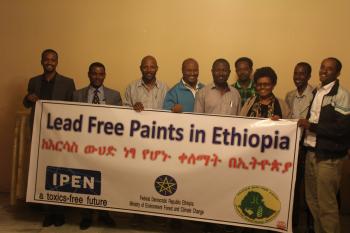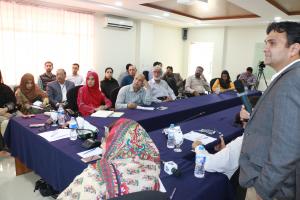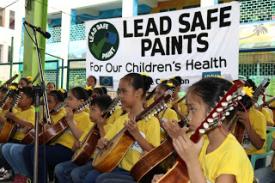Lead paint is a major source of potential lead poisoning for young children. The International Lead Poisoning Prevention Week of Action , co-led by the World Health Organization (WHO) and UN Environment, was established to raise awareness of the widespread availability of lead paint. IPEN and Partners have taken part in awareness-raising activities and other actions during the Week of Action since 2013. Click here for more information about IPEN's previous activities, and find information about some of the activities carried out by IPEN Participating Organizations during the 2017 Week of Action below .
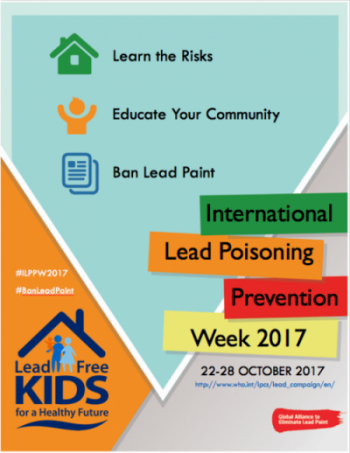
IPEN Press Release : Lead Paints Dangerous to Children Widely Sold Throughout the World
22 October, 2017 (Gothenburg, Sweden): Decorative paint containing levels of lead dangerous to children is widely available in more than 50 low- and middle-income countries, according to a new report released today by IPEN , an international organization promoting safe and sustainable chemical use. Lead in Solvent-Based Paints for Home Use -Global Report is the world’s most comprehensive review of lead in paint sold around the world and brings together data from all paint studies conducted since 2009 in 55 countries in Africa, Asia, Latin America and Eastern Europe. The report also includes never before released data from new studies conducted in 2017 in 19 countries.
Read the entire release here
See the new report here
Read what IPEN POs are doing to raise awareness about lead poisoning prevention:
Argentina
IPEN Participating Organization, Taller Ecologista, took initiative in getting the word out about International Lead Poisoning Prevention Week 2017. "Lead in paint is a concern for health, especially for children. The mental retardation caused by lead at an early age is among the list of diseases recognized by the World Health Organization. Household lead paints continue to be produced, sold and widely used in developing countries, despite the fact that most industrialized countries banned them for domestic use more than 40 years ago. The effects of this toxic metal on health are generally irreversible, and its impact can last a lifetime," says Cecilia Bianco, coordinator of a Toxic Ecological Areas Workshop, giving context to a problem little seen.
Significant media has been generated in Argentina in relation to Taller Ecologista's awareness-raising about International Lead Poisoning Prevention Week 2017:
- https://www.rosario3.com/noticias/Advierten-cantidad-excesiva-de-plomo-en-latas-de-pintura-20170929-0038.html
- http://www.tallerecologista.org.ar/sitio/actividades-sec.php?sec=230
- http://cesus.org.ar/2017/10/13/plomo-en-pinturas-informe-completo/
- https://www.youtube.com/watch?v=FpAxHkZ22HI&feature=youtu.be
- https://www.facebook.com/tallerecologista/posts/10155565759190999t
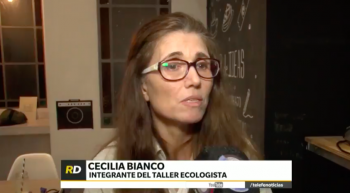
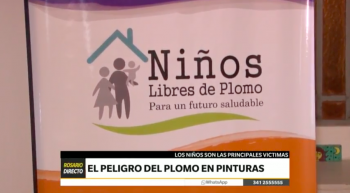
Armenia
IPEN Participating Organization, Armenian Women for Health and the Environent (AWHHE) organized a workshop at the ECOLUR agency in Yerevan, Armenia to highlight the violations of children’s rights to health and a healthy environment connected with lead poisoning. The activities were conducted in the framework of International Lead Poisoning Prevention Week of Action on the 24th of October 2017.
The event was sponsored by IPEN and was aimed to inform mass media and civil society organizations about the International Week of Action, and raise awareness and understanding about the existing risks to children’s health and environment, as well as the violation of children's rights to health and a healthy environment. The workshop also noted and current policies and planning for next steps.
Information about the workshop can be found at both: www.awhhe.am and www.ecolur.org .
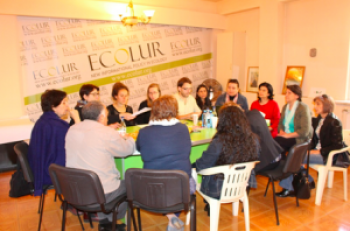
Azerbaijan
The "Ruzgar" Ecological Society held two events to mark the Lead Poisoning Prevention Week of Action in Azerbaijan. On October 23rd, a group of experts met to discuss legislation on the effects of harmful metals including lead and mercury on the environment and human health in Azerbaijan. Legislation already exists to protect people who work with lead materials, but there is no legislative act that limits the amount of lead in household paints. It was decided that work on this legislation will begin and thereafter, presented to the Parliament.
On the 26th of October, a meeting was held with NGOs and media representatives. At the meeting, information about International Lead Poisoning Prevention Week of Action was delivered. The developed proposal on an amendment into legislation aboutt a chemical safety point on the limitation of lead in household paints was discussed and adopted. This amendment will be presented to the Parliament.
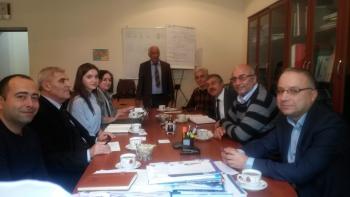
Bangladesh
In observation of International Lead Poisoning Prevention Week of Action 2017, Environment and Social Development Organization (ESDO), with the support of IPEN, organized a high-level policy dialogue titled, ‘Learn the Risks and Ban Lead Paint’ on 26 th October, 2017 at the ESDO office. Syed Marghub Murshed, chairperson of ESDO and former secretary of the government of the People's Republic of Bangladesh, presided over the meeting. Government officials from the Ministry of Health and Family Welfare, Department of Environment, Bangladesh Standards and Testing Institution, representatives from the Bangladesh Paint Manufactures Association, academicians and ESDO officials were present at the meeting.
Government delegations urged for an immediate regulation to ban hazardous lead paint by 2018 and expressed the necessity to immediately instate a standard of 90 ppm lead content in paint.
Executive Director of ESDO, Siddika Sultana, expressed that ESDO hopes the government will immediately take proper steps to ban lead in paint. "We are observing this week, but we are hoping to be celebrating [the elimination of lead in paint] in the near future."
Find a press release from the event here.
Five leading newspapers in Bangladesh published stories covering the high-level policy dialogue:
- http://www.thedailystar.net/city/ban-lead-based-paint-speakers-1482322
- http://www.daily-sun.com/printversion/details/264216/‘Enact-regulation-toban-lead-paint’
- http://dailyasianage.com/news/92205/call-to-ban-lead-paint
- http://www.dailynayadiganta.com/detail/news/263355
- http://www.dailydinkal.net/epaper/2017/10/27/
ESDO also conducted a rally involving a "human chain" on the 28th of October, on which 8 leading newspapers and online media published stories. Below are 4 of the online sources:
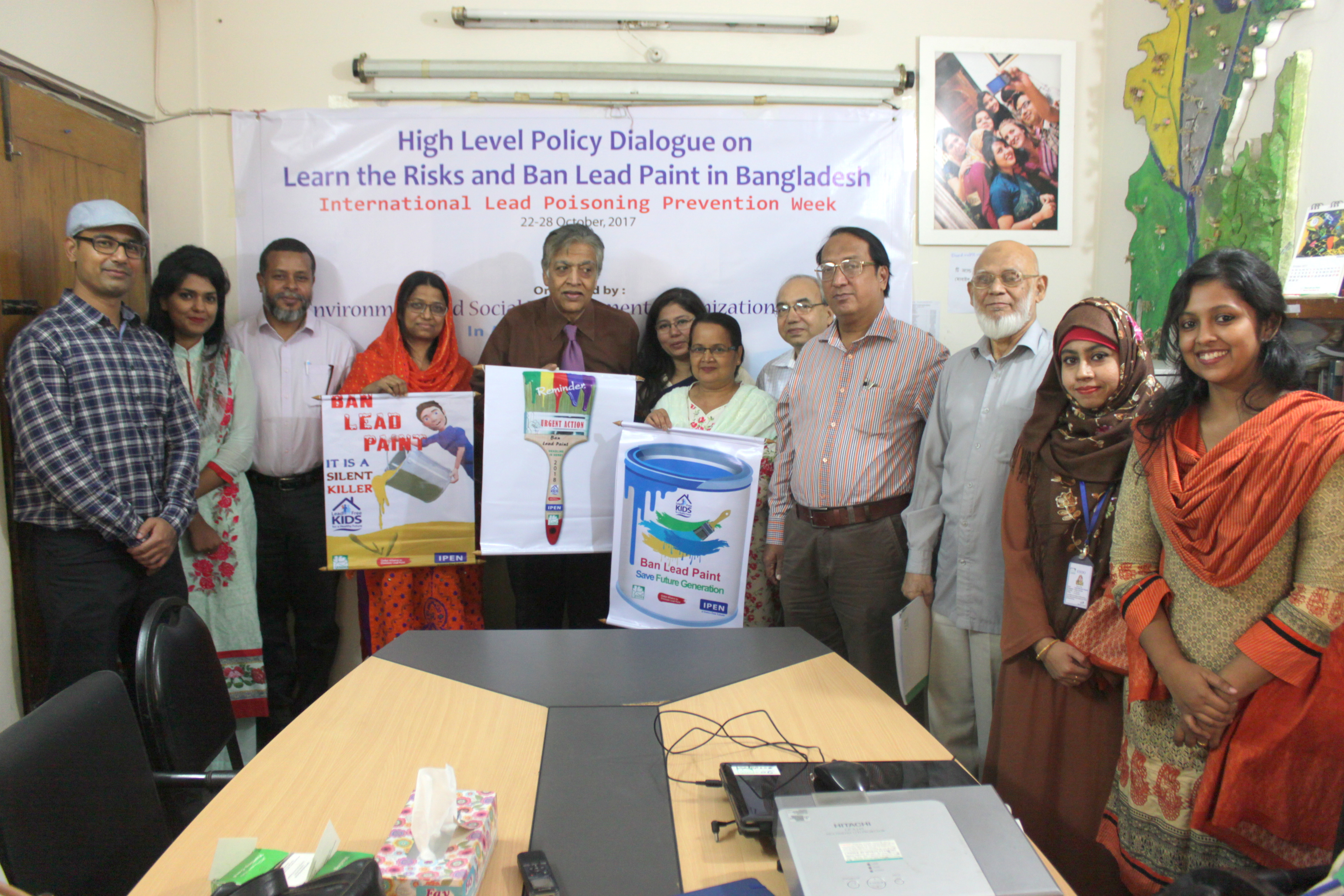
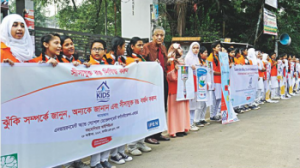
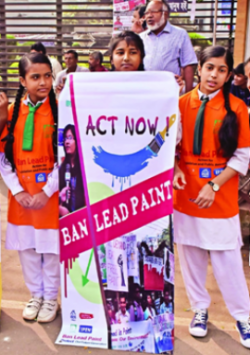
Cameroon
IPEN Participating Organization, Research and Education Centre for Development (CREPD), engaged in the Week of Action beginning with the recording of a television program to cover the event, Follow Me, broadcast on CRTV on the 25th of October, nationwide. Dr. Gilbert Kuepouo (CREPD) was a guest on a national radio show shortly after, and reported information about CREPD's outreach activities and the current regulations on lead in paint in Cameroon.

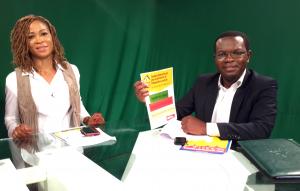
Colombia
In preparation for International Lead Poisoning Prevention Week, the Sustainable Development Network and Colnodo are promoting resources and content about lead on their website and social networks. They have made available information about:
- Health Effects
- Standards and legislation
- Prevention of exposure
- Lead-free production
- Protecting children from exposure
- Risks of lead poisoning
Find these resources here.
Democratic Republic of Congo
IPEN Participating Organization, Planète verte RDC, held a workshop to sensitize the Congolese community about the dangers of lead in paint, beginning with students in the city of Bukavu, the capital of the South kivu province in east Democratic Republic of Congo. The purpose of the workshop was to raise awareness of 6th grade students in the humanities department about the poisonous and dangerous chemical, which surrounding communities are exposed to as a result of local painting productions. Students and teachers were engouraged to make a commitment to inorm their parents and family members about the dangers of lead paint, and a club called "Environment and Health Club" was created for the students to have a platform to talk about this issue.
Read a full report of these activities here.
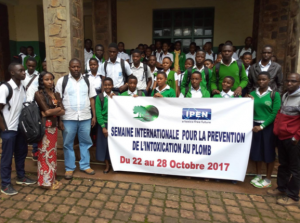
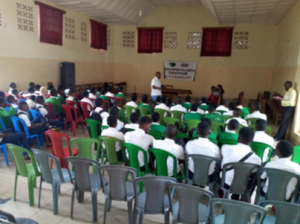
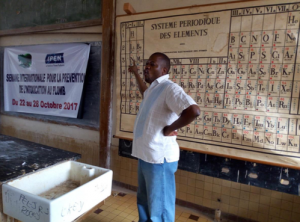
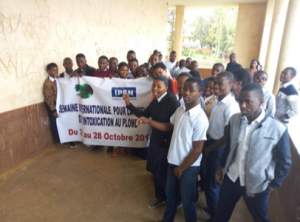
Ethiopia
On October 26th 2017, PAN-Ethiopia, in collaboration with the Ministry of Environment, Forest and Climate Change (MEFCC) conducted the Ethiopian ILPPAW event with a theme of " Lead Free Paints in Ethiopia " in Addis Ababa, Ethiopia. The event was organized specifically to journalists in order to brief them about the status of Lead in Ethiopian paints so as to use their media access to inform the public on how to protect themselves from lead poisoning. As a result, PAN-Ethiopia and MEFCC disclosed the three Ethiopian paint analysis study results conducted by PAN-Ethiopia in 2013, 2015 and 2017; briefed the human health and economic impact of lead poisoning; presented the final version of the draft regulation that MEFCC presented to the council of Ministers for ratification; and encouraged the paint industry that supported the formulation of the regulation to phase out lead from their paint formulations.
Georgia
IPEN Participating Organization, Gamarjoba, has carried out activities during the Week of Action, including the launch of a campaign to sign a petition on legislative initiatives to control lead levels in paint:
Gamarjoba took their campaign to schools, where they conducted lessons raising awareness about the dangers of lead to both children and parents, and began negotiations with representatives of the Ministry of Natural Resources on the opportunites and barriers for creating legislation and presented the report, "Lead in Solvent-Based Paints for Home Use in Georgia."
Gamarjoba took to social media to get their message across, extending the campaign to Facebook and Twitter:
- Overview of the campaign: https://www.facebook.com/Gamarjoba2014Georgia/posts/356335334791923
- Request to sign the legislative petition: https://www.facebook.com/Gamarjoba2014Georgia/posts/356741141418009
- Overview of the campaign: https://twitter.com/ecodefense2/status/923449023557750784
- Request to sign the legislative petition: https://twitter.com/ecodefense2/status/923914113046269952
Find news coverage of the campaign here.
Guinea
IPEN Participating Organization, Carbone Guinée, hosted an advocacy workshop with elected officials on lead paint regulations in the Republic of Guinea at the Ministry of the Environment on October 28, 2017, as part of the International Lead Poisoning Prevention Week of Action. The workshop was attended by 45 executives from the Ntional Assembly, technical directorates,universities, civil society organizations, an public and prival sectors involved in the rational management of products.
The workshop opened with an introduction from the Legal Advisor of the Ministry of Environment, Water and Forests (MEEF), who briefly outlined the objectives, main activities and expected results of the workshop, and gave a brief reminder of the current campaign to phase lead out of paint. She emphasized that regulation is possible with the effort of each stakeholder because the health of our children depends on it. She stressed that this first campaign in Guinea to make a strong commitment to making zero lead in paint by 2020 a reality in Guinea, to improve the protection of health and the environment, and propel forward sustainable development including lead-free paint.
Ibrahima Sory Sylla, President of Carbon Guinée, welcomed and thanked UNEP, GEF, MEEF and made a special acknowledgement to IPEN for providing technical and financial support for the organization of this workshop.
He seized the opportunity to highlight some elements of the sampling report of lead in paints. Ibrahima Sory Sylla briefed workshop attendees about the effects of exposure, and stressed that lead accumulates in the body, affects virtually all organic systems and can have chronic and harmful effects in people of all ages, but is particularly harmful for children. He concluded with strong advocacy messages for the regulation of lead in paints.
Following the presentation, the floor was given to TOPAZ (a local paint producer). The technical director responded to the report of high lead content in TOPAZ paints (yellow color 9700ppm), while underlining that arrangements will be made to reduce the content.
Read an article about the workshop here.
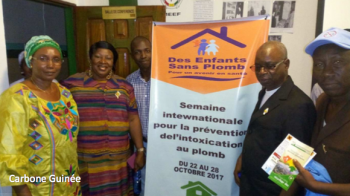
India
IPEN Participating Organization, Toxics Link, released a report titled “Toxic Paints: A Research Report on Lead Content in Household and Decorative Paints,” as part of worldwide activities to mark the International Lead Poisoning Prevention Week of Action, Oct 22 -28, 2017. Find the press release here .
Although in November of 2016 the Ministry of Environment, Forest, and Climate Change (MoEF&CC) issued a gazette notification restricting the lead content of these paints to 90ppm, the report found that more than 73 percent of paints analyzed contained high lead levels. 11 out of 15 paints from the 13 brands analyzed contained exceedingly high lead levels. Furthermore, these 11 paint cans label were not having any consumer information about lead content.
As per the notification of the MoEF&CC, the standard of 90 ppm will be enforced in November of 2017.
As a result of Toxics Link's report release, news coverage was generated about the dangers of lead paint and how common exposure is in India.
Kenya
IPEN Participating Organization, CEJAD, circulated a press release as part of their ILPPWA activities. The release noted a recent report sponsored by IPEN: Lead in Solvent-Based Paints for Home Use in Kenya, conducted in 2017. "The study found that more than 70 percent of paint brands analyzed in the study on total lead in solvent-based paints for home use contained dangerously high lead levels greater than 10,000 ppm. According to the study findings, one yellow paint advertised as 'lead-free' contained lead levels as high as 16 percent of the paint, almost 1,800 times the allowed limit of 0.009 percent (90 ppm) established in many countries for lead in paint and the maximum allowed level in two paint standards adopted by the Kenya Bureau of Standards (KEBs)."
The press release was covered by a national news outlet: https://www.the-star.co.ke/news/2017/10/30/kids-exposed-to-high-levels-of-lead-in-paints_c1660672.
Malaysia
The Consumers' Association of Penang (CAP) issued a statement calling on the authorities to ban lead in products. In the statement, CAP highlighted that Sindoor, a scarlet powder widely used during Hindu religious and cultural ceremonies in Malaysia, was tested for lead in the United States. Sindoor is often used by women who wear a bindi, or red dot, on their foreheads for cosmetic purposes. Hindu men and children also wear it for religious purposes. Tests conducted in the U.S. found dangerously high level of lead in Sindoor. This is because some manufacturers use lead tetroxide to give it a distinctive red colour. Of the 118 sindoor samples tested in the study, 95 were from South Asian stores in New Jersey. Another 23 came from stores in Mumbai and New Delhi in India. Overall, about 80 percent of the samples had at least some lead, and about a third contained levels above the limit set by the U.S. Food and Drug Administration.
"CAP calls on the authorities to:
- Ban lead in products,
- Test products that have been found to contain high levels of lead, and
- Come out with a campaign to create awareness on the dangers of lead.
Without a ban, Malaysia will be a dumping ground for products with high levels of lead that have been rejected by other countries. As lead has a strong impact on children, immediate action need to be taken to safe guard our future generation."
Find a news article about the statement here.
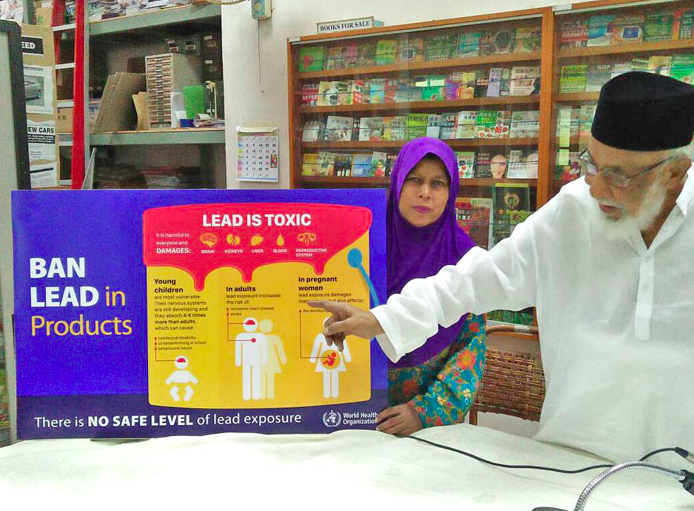
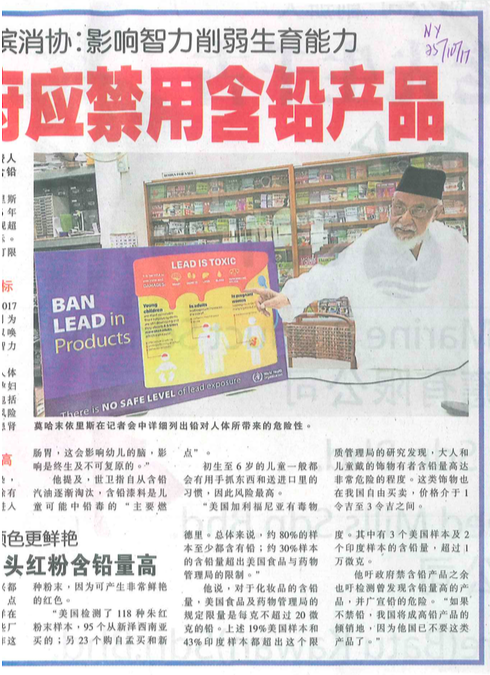
Nepal
In Nepal, the Center for Public Health and Environmental Development (CEPHED) and LEADERS Nepal planned a week-long program in observation of International Lead Poisoning Prevention Week, 2017. CEPHED and LEADERS are collaborating with the Department of Environment, Ministry of Population and Environment (MOPE), and Government of Nepal in association with Nepal Forum of Environmental Journalists (NEFEJ), Nepal Bar Association, PRO PUBLIC, CELSAC, EDFL, Kathmandu Medical College and Samyak Diagnostic Pvt. Ltd. The goal is to provide trainings on lead paint elimination and awareness about the effects of lead poisoning. Read more about this week's planned events here.
Nigeria
On Friday, 20 October, Sustainable Research and Action for Environmental Development (SRADev Nigeria) called on the federal government to draft a regulation that will ban the manufacture, import, export, distribution and use of paints that contain total lead concentrations exceeding 90 ppm (parts per million). The call came following a recent study carried out on lead in Solvent-based Paints for Home Use in Africa, in partnership with IPEN, that revealed shocking information about the lead content in paints used in homes. At the public presentation of the report of the study in Lagos, Executive Director of SRADev Nigeria, Mr. Ane Leslie Adogame, reported that lead is added to most paint to improve its covering power and durability, and used during the production stage as drying agent for preservation of paints, but is, unfortunately, a powerful poison. The SRADev leader called on civil society organisations and professional groups to collaborate with government agencies to carry out awareness-raising campaigns to sensitise the public on the dangers associated with elevated lead levels in the blood, possible sources of lead exposure, and availability of possible technically superior and safer alternatives.
he report presentation, attended by stakeholders including federal and Lagos state officials, paint manufacturers, environmentalists, NGOs and media, included a presentation by school children, who advocated for lead-free paints.
Read more about the event on the Ecogreen News website or on Environews Nigeria.
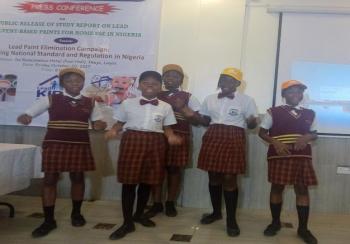
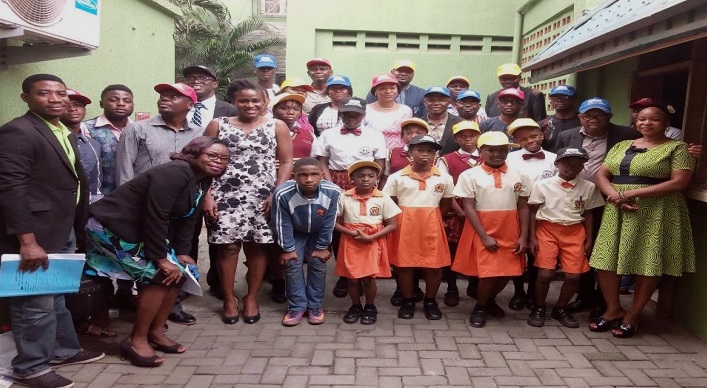
Pakistan
IPEN Participating Organization, Sustainable Development Policy Institute (SDPI), held a seminar to raise awareness about the dangers that lead paint can have on human health and the environment with the release of a new report: Solvent-based Paints for Home Use in Pakistan. Find a press release about the report here.
Media coverage of the report in Pakistan:
- https://www.dawn.com/news/1367623/60pc-paints-have-more-than-the-recommended-amount-of-lead
- https://tribune.com.pk/story/1546423/1-health-hazard-walls-decorative-paints-contain-lead/
Philippines
EcoWaste Coalition hosted an event at the San Vicente Elementary School in Quezon City in which children danced for lead-safe paints to the tune of the popular “Baby Shark” song. EcoWaste Coalition acknowledged the positive steps undertaken by most paint manufacturers to remove lead in paint formulations and minimize the hazards posed by such paints, especially to children’s health. During the event, messages of support from Vice President Leni Robredo, Senator JV Ejercito (Chair of the Senate Committee on Health and Demography) and Representative Ging Suansing (Chair of the House Committee on Ecology) were also read before the enthusiastic crowd of over 550 people.
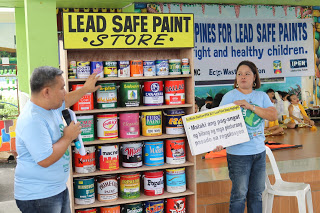
Sri Lanka
At Lady Ridgeway Hospital in Sri Lanka, Centre for Environmental Justice (CEJ) met with Neurologist, Dr. A. Padeniya, as well as mangers and officers from Macsons Paints Lanka Private Ltd. in observation of International Lead Poisoning Prevention Week of Action. A Memorandum of Understanding (MOU) was signed by Mr. Dilena Pathragoda, Managing Director of CEJ, Doctor A. Padeniya, Neurologist of Lady Ridgeway Hospital, and Mr. Ismail Hussain, Chief Operations Officer of Macsons Paints Lanka Private Ltd. to recognize the importance of repainting the hospital with lead-free paints.
Mr. Dilena Pathragoda noted that this event was conducted in regards to Lead Poisoning Preventing Week of Action and that the aim of signing the MOU is to provide paints and surface application solutions with required quality, safety and environmental standards to selected sections of the hospital. Doctor Padeniya described the hospital unit which will be provided with lead-safe paints and thanked CEJ and Macsons Paints Lanka Private Ltd for their contribution towards the painting project.
After the event, officers and members of CEJ distributed leaflets and posters to children, nurses, parents and other officers of the hospital with the intension of raising awareness about the importance of using lead-safe paints.
Find a gallery of the CEJ's involvement in International Lead Poisoning Prevention Week of Action here.

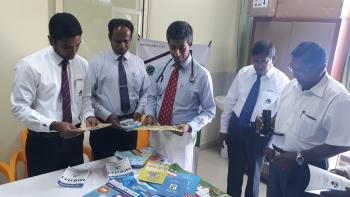
Tanzania
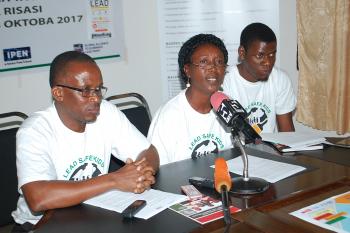
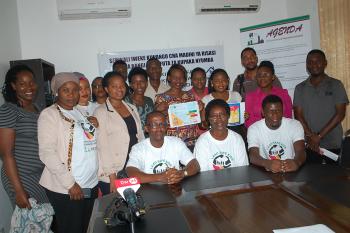
Togo
In observance of International Lead Poisoning Prevention Week of Action, IPEN Participating Organization, Friends of the Earth International-Togo, organized a press conference followed by a conference-debate and mobilization for the establishment of regulations to ban the production, marketing and use of lead paint in Togo. Three presentations were made on the challenges related to the use of lead paint; the merits of the International Lead Poisoning Prevention Week of Action; and the need to adopt legislation prohibiting lead paint in Togo. Following the presentations, a debate took place that allowed attendees to understand the constraints to and advantages of engaging Togo in the elimination of lead paint, and the capacity of the media to mobilize and around the issue. Stakeholders expressed their commitment to set up an alliance to advocate with decision-makers for regulations to ban the production, marketing and use of lead in paint in Togo.
The event generated various media attention:
- http://togotopnews.com/index.php/sante/item/562-l-ong-les-amis-de-la-terre-togo-en-guerre-contre-l-intoxication-au-plomb
- http://afreepress.info/afreepress/index.php/nouvelles/sante/item/2635-l-ong-les-amis-de-la-terre-togo-contre-l-utilisation-de-la-peinture-au-plomb-au-togo
- http://www.gapola.net/2017/10/les-amis-de-la-terre-togo-engages.html
- http://www.manationtogo.com/les-amis-de-la-terre-togo-plaide-pour-linterdiction-de-la-peinture-au-plomb-au-togo/
- https://lesamisdelaterretogo.wordpress.com/2017/10/23/semaine-daction-de-prevention-de-lintoxication-au-plomb/
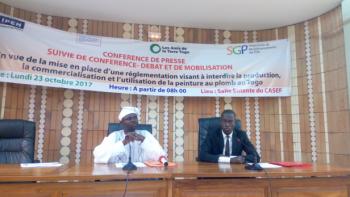
Tunisia
The Association for Environmental Education for Future Generations (AEEFG) in Tunisia took International Lead Poisoning Prevention Week of Action to schools, getting children involved in the the campaign for lead-free paint and highlighting the importance of removing lead paint exposure to children. On the 25th of October in Kasserine, students painted the Global Alliance to Eliminate Lead Paint (GAELP) logo as a mural on a school wall with lead-free paint. On the 26th of October at a school in the Tunis capital, students took photos with ILPPWA posters in the first classroom to be painted with lead-free paint as a result of the campaign.
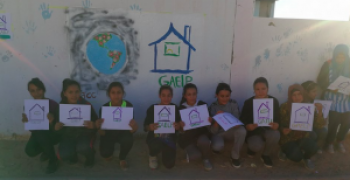
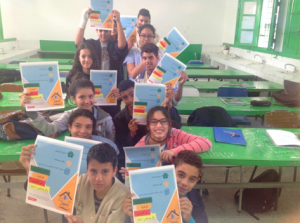
Uganda
The National Association of Professional Environmentalists (NAPE) held a press conference at Hotel Triangle calling upon government through NEMA and UNBS to put up regulations against paint companies that use high percentages of lead in their paint. The Executive Director of NAPE, Frank Muramuzi, said that the biggest challenge is to differentiate the paint with or without lead and many companies are hiding behind this. “Paint companies do not indicate on their tins the ingredients they use to make the paint because they know that one of the ingredients, lead, is extremely dangerous to children,” Muramuzi stated.
Read the press release here.
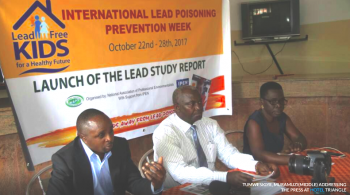
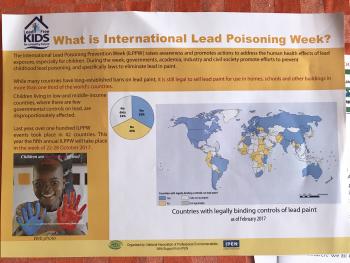
Vietnam
The Research Centre for Gender, Family and Environment in Development (CGFED) organized a successful national workshop on lead paint elimination on 24 October 2017. Participants included representatives from the VINACHEMIA (Ministry of Industry and Trade), National Institute of Occupational and Environmental Health (Ministry of Health), Hanoi School of Public Health, Bach Mai Hospital, Vietnam Paint and Printing Ink Association, civil society organizations and individuals interested in understanding the dangers of lead-based paint. Press agencies also came to the workshop. All participants agreed that the state management agencies should quickly promulgate regulations to control the concentration of lead in paint, the first being decorative paints for home and school-use. Participants also suggested that NGOs/GOs should promote health education and awareness raising on the health hazards of using lead paint. Read the press release here.
The workshop generated significant media coverage:
- http://baothainguyen.org.vn/tin-tuc/thoi-su-trong-nuoc/huong-toi-loai-bo-chi-trong-son-tai-viet-nam-249863-206.html
- http://www.qdnd.vn/xa-hoi/tin-tuc/canh-bao-nguy-co-ngo-doc-chi-o-viet-nam-521569
- http://daibieunhandan.vn/default.aspx?tabid=74&NewsId=397290
- https://www.youtube.com/watch?v=IS1KW6XRdrI&feature=youtu.be
- https://www.facebook.com/CGFED/
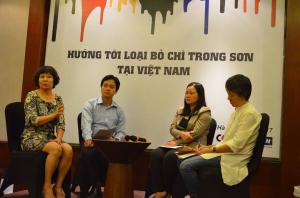
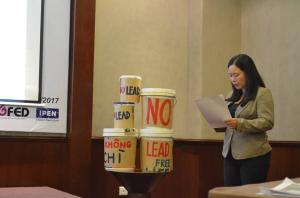
Zambia
The results of a national study conducted by Children’s Environmental Health Foundation (CEHF) and IPEN were released on Saturday, 21 October, during an open event hosted by the Zambia Institute of Mass Communication and the Livingstone Press Club.
CEHF national lead elimination advisor, Michael Musenga, who released the findings, said nine out of 13 paint brands produced at least one paint with exceedingly high lead concentration. “The majority of brightly colored paints contained lead concentrations above 90ppm (parts per million), while yellow paints were the most hazardous with a concentration above 10,000 ppm. The highest lead concentration of 120,000 ppm was detected in an orange paint. None of these paints provided information about lead on their labels and most paints carried little information about ingredients,” Mr. Musenga said. Read the official press release here.
The Ministry of Local Government sent invitations to stakeholders asking them to attend a workshop on the of phasing out lead in paint on the 2nd of November, in which the findings of the national study will also be presented. Those expected to attend are permanent secretaries, provincial medical directors, and heads of local authorities in 10 provinces of Zambia, including universities.


